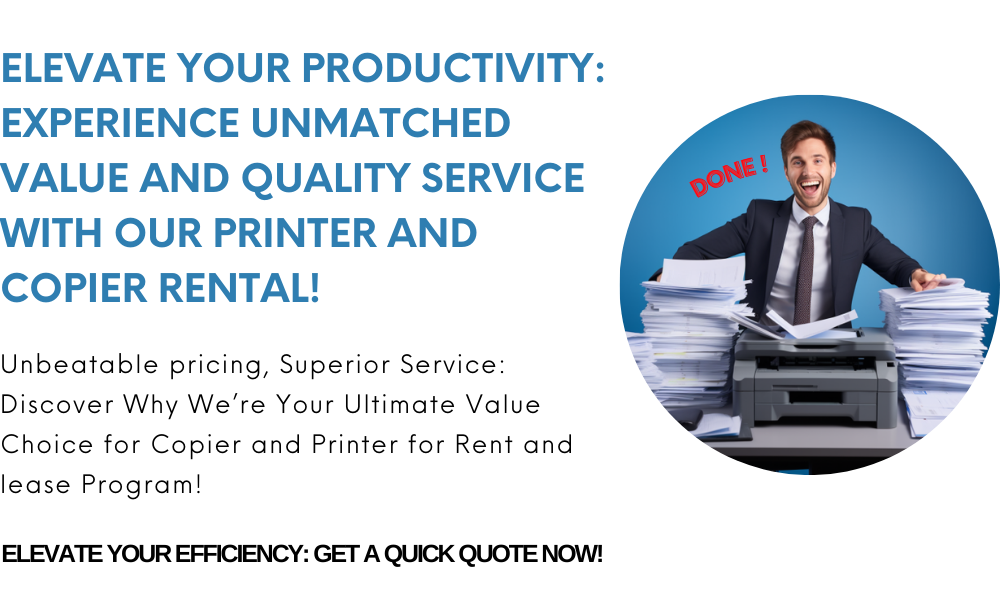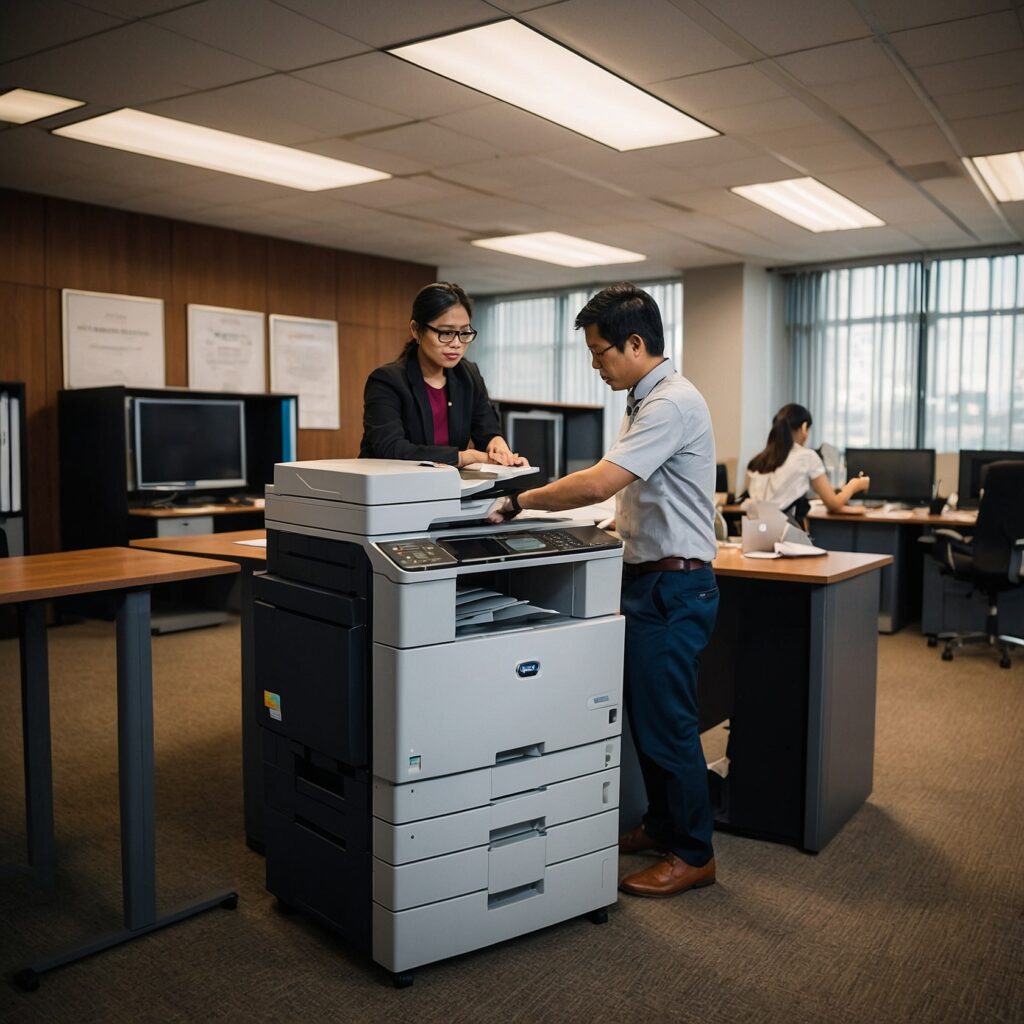
Unleashing Business Potential with Copier Leasing

Unleashing Business Potential with Copier Leasing
Part 1: Why Copier Leasing is a Smart Business Move
Introduction
In today’s competitive business environment, operational efficiency and cost management are critical to success. One essential yet often overlooked component of office productivity is a reliable copier. For businesses in the Philippines, copier leasing has emerged as an effective way to access advanced technology, manage costs, and unlock new levels of efficiency.
This blog explores the advantages of copier leasing, providing detailed advice for entrepreneurs planning to lease, discussing policies tied to leasing agreements, and examining how leasing differs from purchasing outright. Whether you’re a startup, SME, or an established enterprise, copier leasing could be the strategic solution to unleash your business’s full potential.
Understanding Copier Leasing
Copier leasing involves renting a copier for a fixed monthly fee rather than purchasing it outright. This arrangement allows businesses to access high-quality equipment without the upfront costs associated with ownership. Leases typically include additional services such as maintenance, repairs, and consumable supplies, making them a comprehensive solution for office document management needs.
Key Features of Copier Leasing:
- Fixed Monthly Costs: Simplified budgeting with predictable expenses.
- Maintenance and Repairs: Included in most leases, reducing downtime and repair costs.
- Access to Advanced Technology: Businesses can upgrade to newer models during or after the lease term.
- Scalability: Easy to adjust the agreement to accommodate growth or changes in printing needs.
Advantages of Copier Leasing
1. Cost Management
Leasing eliminates the need for a large initial investment, making it an attractive option for startups and small-to-medium enterprises (SMEs). The fixed monthly payments allow businesses to allocate their resources more effectively, prioritizing growth initiatives rather than equipment expenses.
Example: A startup in Cebu leased a multifunction copier for ₱5,000 per month. The same model would have cost ₱250,000 upfront to purchase, freeing capital for marketing and hiring efforts.
2. Technology Access
Technology evolves rapidly, and copiers are no exception. Leasing allows businesses to stay current with the latest advancements, such as cloud-enabled devices, mobile printing, and energy-efficient models, without the financial burden of upgrading frequently.
3. Maintenance and Support
Most leasing agreements include maintenance and repair services. This ensures minimal downtime and saves businesses the hassle of finding third-party repair services.
Pro Tip: Opt for a lease that guarantees a standby unit or expedited repairs to avoid disruptions in case of equipment failure.
4. Flexibility and Scalability
As businesses grow, their document management needs often increase. Leasing allows for easy upgrades or additions to the agreement, ensuring that your office equipment scales with your operations.
5. Tax Advantages
In the Philippines, lease payments are often deductible as business expenses, offering potential tax benefits that purchasing equipment does not provide. Consult with a tax advisor to fully understand how leasing can optimize your tax strategy.
Policies Tied to Copier Leasing
Understanding the policies associated with copier leasing agreements is critical for making informed decisions.
1. Lease Duration
Most leases range from 12 to 60 months. Shorter leases offer more flexibility, while longer leases typically come with lower monthly payments.
2. Maintenance and Service Inclusions
Maintenance is usually included in the lease, covering routine servicing and repairs. Ensure your agreement specifies response times and whether consumables like toner and paper are included.
3. Fair Usage Limits
Leasing agreements may include fair usage policies to prevent excessive wear and tear. Clarify these limits to avoid overage charges.
4. End-of-Lease Options
At the end of the lease term, businesses can:
- Renew the agreement.
- Upgrade to a newer model.
- Return the equipment without additional obligations.
5. Early Termination Clauses
Some leases impose penalties for early termination. Entrepreneurs should review these terms carefully to avoid unexpected costs if their business needs change.
Advice for Entrepreneurs Planning to Lease
Entrepreneurs in the Philippines can maximize the benefits of copier leasing by following these steps:
1. Assess Your Business Needs
- Determine your monthly printing volume.
- Identify essential features like color printing, scanning, and mobile connectivity.
- Consider the physical size of the copier and its compatibility with your office layout.
2. Research Providers
Look for leasing companies with strong reputations, positive customer reviews, and transparent pricing. Some of the top providers in the Philippines include Canon, RICOH, and local suppliers with region-specific expertise.
3. Negotiate Terms
Don’t hesitate to negotiate terms that suit your business. This includes requesting flexible payment schedules, shorter lease durations, or equipment upgrades at no additional cost.
4. Understand Maintenance Policies
Confirm that maintenance, repairs, and replacement parts are included in the lease. Ask about response times for service requests to avoid prolonged downtime.
5. Plan for Growth
Choose a leasing agreement that allows for easy upgrades or additional equipment as your business expands.
Real-Life Success Story
The Challenge:
A Manila-based marketing agency struggled with an outdated copier that frequently broke down, causing missed deadlines and frustrated employees.
The Solution:
The agency leased a multifunction copier with cloud integration, mobile printing, and high-speed output. Maintenance and repairs were included, ensuring consistent performance.
The Results:
- Increased productivity: Deadlines were met without disruptions.
- Reduced costs: Monthly leasing payments were lower than the agency’s previous repair bills.
- Improved morale: Employees had access to reliable tools, boosting efficiency and satisfaction.
FAQs
Q1: Is leasing better than buying a copier?
Leasing is ideal for businesses prioritizing flexibility, cost management, and access to advanced technology. Buying may be better for companies with stable needs and long-term budgets.
Q2: Can I upgrade my leased copier during the contract?
Many leasing agreements include options to upgrade equipment mid-term. Confirm this feature before signing the lease.
Q3: What happens if the copier breaks down?
Most leases include maintenance and repair services. Ensure your agreement specifies response times for repairs to minimize downtime.
Q4: Are consumables included in copier leases?
Some leases include consumables like toner, while others charge separately. Clarify these details with your provider to understand the total cost.
Q5: Can I end my lease early?
Early termination is possible but may incur penalties. Review the agreement’s termination clause carefully before signing.

Unleashing Business Potential with Copier Leasing
Part 2: Maximizing Business Potential with Advanced Leasing Strategies
Introduction
In Part 1, we explored the basics of copier leasing and how it can help businesses save costs, access advanced technology, and improve productivity. In this section, we’ll take a deeper dive into strategies that businesses can use to maximize the benefits of copier leasing. We’ll also examine how the copier leasing industry is evolving in the Philippines, with a focus on new technologies, sustainability initiatives, and future trends.
Advanced Strategies for Copier Leasing
To fully unlock the potential of copier leasing, businesses need to think strategically. Here are some advanced strategies to consider:
1. Leverage Cloud and Digital Integration
Many modern copiers support cloud connectivity, allowing seamless integration with platforms like Google Drive, OneDrive, and Dropbox. This feature is particularly useful for businesses with remote or hybrid work setups, as employees can print and access documents from anywhere.
Example: A law firm in Cebu digitized its workflow by leasing a cloud-enabled copier. Legal documents could be scanned and stored directly in a secure cloud folder, reducing physical storage needs and enhancing collaboration among remote team members.
2. Optimize Usage with Analytics
Advanced copiers come with built-in usage tracking features that provide insights into print volumes, paper usage, and user behaviors. Analyzing this data can help businesses identify inefficiencies, such as unnecessary color printing or underutilized features, and implement cost-saving measures.
Pro Tip: Use analytics to set department-specific printing quotas and enforce double-sided printing policies to reduce waste.
3. Align Leasing Plans with Business Cycles
Businesses with seasonal or project-based workloads can benefit from flexible leasing plans. For instance, a retail company might need additional printing capacity during the holiday season. Leasing agreements that allow for scaling up or down ensure businesses only pay for what they need.
4. Train Employees on Features and Best Practices
Proper training ensures employees understand how to use advanced copier features, such as mobile printing, secure printing, and scanning to email. This minimizes errors, reduces misuse, and maximizes productivity.
Tip: Many leasing providers offer complimentary training sessions as part of their service agreements.
5. Incorporate Sustainability Goals
Leasing eco-friendly copiers aligns with sustainability initiatives while reducing energy consumption and waste. Look for providers offering energy-efficient devices, consumable recycling programs, and paperless solutions.
Example: An IT company in Manila reduced its carbon footprint by leasing an energy-efficient copier with a toner recycling program.
The Evolution of Copier Leasing in the Philippines
The copier leasing industry in the Philippines is adapting to changing business needs and technological advancements. Here’s how the landscape is evolving:
1. Subscription-Based Models
Similar to software-as-a-service (SaaS) platforms, subscription-based leasing is gaining popularity. Businesses pay based on usage or feature requirements, ensuring cost-efficiency and flexibility.
Impact: Startups and SMEs can access high-quality equipment without committing to long-term contracts.
2. AI-Powered Maintenance and Diagnostics
Artificial intelligence is transforming copier maintenance. Smart copiers can detect potential issues before they occur, notify providers, and schedule preventive servicing. This minimizes downtime and ensures uninterrupted productivity.
3. Enhanced Data Security
With data privacy regulations like the Philippine Data Privacy Act (RA 10173), businesses are prioritizing secure document handling. Modern copiers include features like user authentication, encrypted printing, and automatic data wiping to protect sensitive information.
Relevance: Industries such as healthcare, finance, and legal services benefit significantly from these security enhancements.
4. Focus on Eco-Friendly Solutions
Sustainability is no longer optional—it’s a business imperative. Leasing providers are introducing energy-efficient models, duplex printing defaults, and digital-first solutions to reduce environmental impact.
Pro Tip: Businesses adopting sustainable leasing practices can enhance their brand reputation and appeal to eco-conscious clients.
5. Short-Term Leasing Options
Short-term leases are becoming more popular for businesses with temporary needs, such as event management companies or seasonal operations. These agreements offer the flexibility to scale down without long-term commitments.
Policies Shaping the Future of Copier Leasing
The copier leasing industry is influenced by several policies and regulations aimed at ensuring transparency, sustainability, and data protection:
1. Data Privacy Compliance
Providers must comply with the Philippine Data Privacy Act, ensuring leased copiers handle sensitive information securely. Businesses should verify that their provider offers encrypted data storage, secure deletion features, and audit trails.
2. Fair Usage Agreements
Leasing agreements often include fair usage limits to prevent overuse or excessive wear and tear. Businesses should monitor their usage regularly to stay within these limits and avoid penalties.
3. Sustainability Incentives
As part of corporate social responsibility (CSR) programs, businesses may receive incentives or tax breaks for adopting eco-friendly equipment. Leasing providers are aligning with these trends by offering green-certified copiers.
4. Flexible Payment Structures
Many providers are introducing flexible payment terms to accommodate the diverse needs of Philippine businesses. These include pay-per-use models, subscription plans, and deferred payment options.
5. Maintenance Guarantees
Maintenance policies are becoming more customer-focused, with guaranteed response times, standby units, and 24/7 support included in most agreements.
Strategic Opportunities for Businesses
Businesses that embrace copier leasing can position themselves for long-term success. Here’s how:
1. Streamline Operations
Copiers with multifunction capabilities simplify workflows by combining printing, scanning, copying, and faxing into one device. This reduces the need for multiple machines and frees up office space.
2. Enhance Employee Productivity
Advanced features like mobile printing, cloud integration, and high-speed output enable employees to work more efficiently, meeting deadlines without delays.
3. Focus on Core Activities
By outsourcing copier maintenance and management to the leasing provider, businesses can focus on their core operations rather than equipment troubleshooting.
4. Stay Competitive
Access to the latest technology ensures businesses remain competitive in their industry. Upgrading to newer models during the lease term allows companies to leverage innovative features without significant investments.
FAQs
Q1: Can I negotiate the terms of a copier lease?
Yes, most providers are open to negotiation. Businesses can request flexible payment terms, shorter contract durations, or upgrade options to align with their needs.
Q2: What are the key differences between leasing and renting?
Leasing typically involves long-term agreements with the option to upgrade or purchase the equipment at the end of the term. Renting is usually short-term and may not include maintenance or support services.
Q3: How can I ensure my leased copier is secure?
Opt for models with features like user authentication, encrypted printing, and data wiping. Verify that the provider complies with data privacy regulations.
Q4: Is copier leasing suitable for startups?
Absolutely. Leasing offers startups access to high-quality equipment without the upfront costs of ownership, making it a budget-friendly option for scaling operations.
Q5: What happens if my copier breaks down?
Most leases include maintenance and repair services. Contact your provider immediately to resolve the issue and minimize downtime.
Q6: Can I adjust my leasing plan mid-contract?
Many providers offer flexible plans that allow businesses to upgrade or add equipment mid-contract. Discuss this option during negotiations.
Q7: Are energy-efficient copiers more expensive to lease?
While some eco-friendly models may have slightly higher leasing fees, the savings on energy consumption often outweigh the additional cost.
Q8: How can I determine the right copier model for my business needs?
Assess your document management requirements, including print volumes, color printing needs, and additional features like scanning or mobile connectivity. Consult with your leasing provider to match these needs to the most suitable copier model.
Q9: Are there any hidden costs associated with copier leasing?
Hidden costs can include charges for exceeding fair usage limits, additional consumables, or penalties for early termination. Carefully review the lease agreement and ask your provider for a detailed breakdown of all potential costs.
Q10: Can leasing providers customize agreements for unique business needs?
Yes, many providers offer tailored leasing agreements to suit specific requirements, such as short-term leases, scalable plans, or bundled services like maintenance and consumables.
Q11: What should I look for in a leasing provider?
Look for a provider with a strong reputation, responsive customer service, and a wide range of copier options. Prioritize providers that offer clear terms, flexible agreements, and advanced features like sustainability initiatives and data security compliance.
Conclusion
Copier leasing is more than just a financial decision—it’s a strategic investment in your business’s productivity and growth. By adopting advanced leasing strategies, aligning with sustainability initiatives, and leveraging the latest technology, businesses in the Philippines can unlock their full potential.
Now is the time to explore copier leasing as a powerful tool for innovation, efficiency, and long-term success. Partner with a trusted provider and take the first step toward transforming your operations.
Start Renting Today
Printer rentals provide a practical, flexible, and budget-friendly solution for businesses of all sizes. Whether you’re comparing printer rentals vs. purchasing, searching for eco-friendly options, or exploring solutions for high-performance printers, we have the right plan for you.
For more answers to common questions, visit our printer rental FAQs. Explore our customizable printer rental contracts and find the perfect fit for your business needs today. Let us help you enhance efficiency and flexibility with a rental plan designed for success.
To learn more about printer rentals and how Marga Enterprises can support your green initiatives, contact us today at 09171642540 or 09614481276. You can also reach us via email at marga.enterprises2013@gmail.com. Let’s work together to build a greener, more sustainable future for generations to come. Visit Marga Enterprises and find out why we are the No. 1 Copier & Printer Rental Provider in the Philippines.
Join our growing community on Facebook and Youtube for exclusive content and discussions designed to propel your business forward. Stay updated on our posts and be part of the conversation!